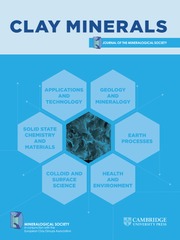Article contents
Caesium desorption from layer silicate minerals using quaternary ammonium salts
Published online by Cambridge University Press: 03 September 2018
Abstract
The adsorption and desorption of cesium onto layered minerals, zeolite and geochemical reference samples were studied. 0.5 g of bentonite and mica were able to adsorb 71.2 and 51.5 mg of cesium, respectively, from 50 mL of deionized water containing 200 mg/L of cesium under neutral pH condition. These amounts of cesium adsorption were greater than those reported for vermiculites (8.9 and 5.6 mg, respectively). Additionally, the cesium adsorption on mica and vermiculite remained essentially unchanged under seawater conditions, but it decreased drastically on zeolite. The cesium desorption from the layered minerals was promoted by the addition of ammonium ions, namely trioctylmethylammonium chloride and zephiramine. These ammonium ions desorb cesium from the interlayers of the minerals without destroying the mineral structure. The cesium desorption procedure using quaternary ammonium ions would be extremely useful for decontamination of soil containing the layered minerals with adsorbed radioactive cesium.
Keywords
- Type
- Article
- Information
- Copyright
- Copyright © Mineralogical Society of Great Britain and Ireland 2018
Footnotes
Guest Associate Editor: M. Elsayed
This paper was originally presented during the session: ‘ES-02 Environmental applications of clay minerals’ of the International Clay Conference 2017.
References
REFERENCES
- 4
- Cited by


